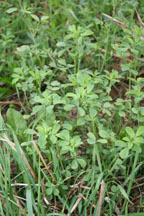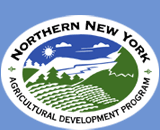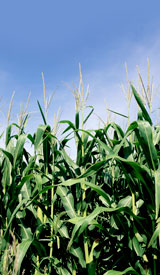January 27, 2010
Contacts: see list at end of release
Farm Forage Yield Trial Results Now Online
The 2009 forage yield trial results for 180 varieties of eight types of
forage legumes or grasses are helping farmers with critical
decision-making for the 2010 planting season. Reports with season
harvest totals as well as per cutting yields are now available online at
www.nnyagdev.org.
 A team of Cornell University researchers conducts the trials annually.
Project leader Julie L. Hansen, a senior research associate with the
Department of Plant Breeding and Genetics at Cornell University’s
College of Agriculture and Life Sciences, says, “Plant breeders are
continually developing and improving cultivars for such characteristics
as forage quality and yield, and disease and insect resistance.”
A team of Cornell University researchers conducts the trials annually.
Project leader Julie L. Hansen, a senior research associate with the
Department of Plant Breeding and Genetics at Cornell University’s
College of Agriculture and Life Sciences, says, “Plant breeders are
continually developing and improving cultivars for such characteristics
as forage quality and yield, and disease and insect resistance.”
The field trials — conducted at Cornell University fields in Ithaca, NY,
and at W. H. Miner Agricultural Institute in Chazy, NY — provide data on
how well the cultivars live up to breeder and farmer expectations.
The forages and grasses evaluated include alfalfa, red clover, birdsfoot
trefoil, timothy, orchardgrass, tall fescue, bromegrass, and perennial
ryegrass.
The farmer-driven Northern New York Agricultural Development Program
provided funding to evaluate alfalfa varieties at Cornell-managed field
trials at Miner Institute. Testing the seed under NNY growing conditions
is important for regional implications.
For example, Hansen says, “We have seen that cultivars that have fall
dormancy ratings higher than 4 may have unacceptable winter-hardiness
for New York, particularly in Northern New York.”
Field Crops Educator Michael E. Hunter with Cornell Cooperative
Extension of Jefferson County says, “The Cornell University forage
legume and grass variety trials are excellent decision-making resources
that farmers can use in the selection of the best forage legume or grass
varieties for their farms. The variety trials provide farmers an
opportunity to compare the grass yield, quality and maturity differences
among varieties."
Michael H. Davis, farm manager at the Cornell E.V. Baker Agricultural
Research Farm in Willsboro, oversees the field trials at Miner
Institute. Davis says, “By hosting these field trials in the Northern
New York, we can provide farmers with real world information about
varietal performance under our unique regional growing conditions. This
is data farmers can have confidence in when searching for varieties. The
trials are designed to help prevent farmers from spending money on a
variety that are well suited to their farms,” Davis says.
“The seed cost of improved cultivars can be higher than for other
cultivars, but this cost is generally offset when there is improved
performance at each harvest over the life of the stand,” Hansen adds.
“Cultivar performance should be critically evaluated by comparing yield
with other cultivars in two or more trials that are in the second or
later year of production. The data help farmers select varieties that
have the best opportunity to fit their forage programs.”
The complete results of the 2009 New York Forage Legume and Grass
Variety Yield Trials by J. Hansen, D. Viands, R. Deubler, J. Crawford,
E. Thomas, and J. Schiller is online at www.nnyagdev.org; click on
Grass-based Agriculture. #
# #
Contacts:
• Julie L. Hansen, Cornell University, 607-255-5043
• Michael H. Davis, Cornell EV Baker Agricultural Research Farm at
Willsboro, 518-963-7492
NNY Cornell Cooperative Extension Field Crop Educators:
• Clinton County: Emily Myers, 518-353-4949
• Essex County: Anita Deming, 518-962-4810
• Franklin County: Stephen Canner, 518-483-7403
• Jefferson County: Michael E. Hunter, 315-788-8450
• Lewis County: Joseph Lawrence, 315-376-5270
• St. Lawrence County: Stephen Canner, 315-379-9192



